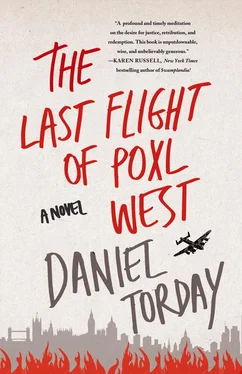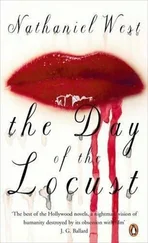He was just a pile of bones in a blue wool suit.
1.
The morning after my talk with Percy I went to the office of my superior officer and once and for all tendered my resignation from the Royal Air Force. I wrote Niny, asking her to send the money I’d saved, and which I’d left in our flat for safekeeping. I would arrange for a flight to Rotterdam as soon as the money arrived.
My wait lasted more than a month. Finally I found myself on an RAF air transport to Rotterdam. Even having lived in Holland for a year, I’d never seen the Nieuwe Maas from the wide view provided by thousands of feet of altitude. As beautiful as it was to see that huge port from an aeroplane, something of the image didn’t comport with the trek I’d embarked upon. I’d spent so much of the years since I left Holland aloft, in an aeroplane, or thinking of flying, or remembering time aloft. The harbor appeared somehow too placid from my perch as we made our swooping arrival from the east.
A new set of cranes had replaced the ones where I’d once spent my days at work. A row of new buildings had been erected by those towers whose operation had once required the linguistic skills of a young Czechoslovak immigrant. This is little to tell compared with the new building that had accompanied the regrowth of that city after its near decimation by the Luftwaffe.
In Delfshaven, I walked every block I’d once known, knocking on doors, ringing doorbells. I found no one home at the flat where Françoise had once lived in Veerhaven. No one at Greta’s and Rosemary’s. Along the stagnant canals of the city, it struck me that perhaps the best place to ask after her was the Brauns’. With an adopted daughter and a dental practice to look after, they were most likely not to have been displaced in the years of the occupation. I arrived at the house of that old schoolteacher and her dentist husband. A hulking blond golem of a man opened the door. His shoulders were as broad as the doorway. “Is this the home of”—I realized at that moment I didn’t even recall their Christian names—“the Brauns, the dentist and schoolmarm?”
“No one by that name lives here,” the man said in his gruff Dutch.
Though I’d resigned my post in Wunstorf, I hadn’t yet acquired any civilian clothing. I was still clad in my RAF blues. This fact afforded me a certain courtesy of the emancipator — and burdened me with the formality paid one in a position of authority. In this situation, it kept the Brauns’ door from being closed in my face. This golem suggested I go to the end of his street, where an elderly woman called Van Leben knew much of the changes to the businesses and residences in the neighborhood.
I made my way to the doorway that might bring me one step closer to discovering Françoise’s fate. I knocked.
The door opened.
Fräulein Van Leben was hunched and crooked, and on her chest sat an apron below the stoic blankness of her wrinkled white face. When she opened her door, she asked, aloof but polite, that I step in over the threshold.
I asked whether she knew the couple who before the war lived in the house I’d just come from down her block, a couple called Braun?
“Ah, yes,” she said. “The dentist.”
She appeared reluctant to say anything more while standing at the doorway. An old woman like this had clearly experienced a multitude of men in uniform during the war years. I explained that I knew the family acquaintances in the days before the war broke out. In those days we had shared friends — a woman named Françoise, her friends Greta and Rosemary. Did she know what had become of them?
Now she stared at me with mild contempt.
“All those types are gone now,” she said. “Germans took them away very early on.”
She paused. The grimace on her face relaxed. She continued, aware of the cold comfort she had offered. The day was frigid and damp. I removed my boots. She wandered back toward a sitting room at the rear of her house. I followed her and waited while she repaired to her kitchen to brew a pot of tea. This home was so similar in every way to the flats I’d entered in the period I lived there in Rotterdam. Up the center of the place was a narrow staircase identical to the one I’d ascended at that first party with Greta and Rosemary; to the back was a large picture window. It looked out upon an overgrown garden. Old Van Leben returned from the kitchen with a pot of black tea. We observed the peculiarities of the day’s weather. She inquired after my uniform. My accent wasn’t British. I said I’d moved from north of Prague to a place here in Rotterdam before the war at my father’s behest. So what had become of me in those days after I left the city where we now sat?
As would occur for many years after that day, I found a bottlenecking of the story I might have told her. I thought to say something about Françoise, about the details of my time in Rotterdam. But here we were in Rotterdam! Instead I thought to inform her of my escape from that city where we now sat, about my time with Niny — as a squaddie — discovering news of my parents — my injuries in training for the RAF — the great thundercloud that struck the Lancaster S-Sugar.
Each time I opened my mouth, I didn’t know what story I would be telling. The story of a Jew who had left his home to do — what? To fall in love? To save Londoners? To scour Western Europe in a search of a woman who might be dead? To take to the skies and exact revenge? I asked Fräulein Van Leben if she had been in Rotterdam when the Luftwaffe bombed.
“I have been in this house since 1893,” she said. “That year I was orphaned by typhus.”
From the decrepit look of the place I suppose I should have made some such conjecture. The upheaval of the past years had caused me to expect change, where now I was faced with a measure of permanence — or at the minimum, serious longevity.
“What I am getting at,” I said, “is not so much the full span of your tenure in this house as your specific experience during the period of the bombing itself.”
Now it was Van Leben’s turn to grow taciturn. She sat back and sipped her tea. We both looked off at the tulips growing in their beds outside her window.
“I stayed in my basement three days,” she said. “Lived there. When the noise stopped, I came up. I sat by my window, but always near to the entrance to my basement.”
Van Leben stood and walked to the front of her house. I followed in my stocking feet. Two picture windows looked out on her block. They stood uncovered. Across the street was a gap in the block maybe four or five town houses wide. It had been cleared of rubble. No reconstruction had yet begun.
“The Hoffstetlers lived there since before my parents bought this house.” She was pointing to some space amid the emptiness at the middle of the block opposite her home. “They had four dogs. Four beautiful German shepherds. Gustav, Gerta, Gideon, and Hilda. They walked the four dogs every day — every morning, every night.
“After the bombing I watched them carry the bodies out. Huge dogs. Heavy as men. The Hoff settlers had a piano and many paintings. I did not see them carry out any piano or paintings. Only dogs.
“Machines came and cleared the stones and the lumber. I watched them carry away stones. Wood. Long after they carried out the dogs.”
Fräulein Van Leben looked out the window to that space where the dogs’ bodies and rubble had once been. She walked me to her back room again. For a long time we didn’t talk, for it became apparent that what we both tacitly needed for a moment was to be around another human, while not talking. We both drank our tea and looked out again at her flowers.
“That was long before they began to take anyone away,” Fräulein Van Leben said. There was something in her eyes then, a way they were moving back and forth, searching my face, that made me believe in the moment perhaps she had more to tell.
Читать дальше












